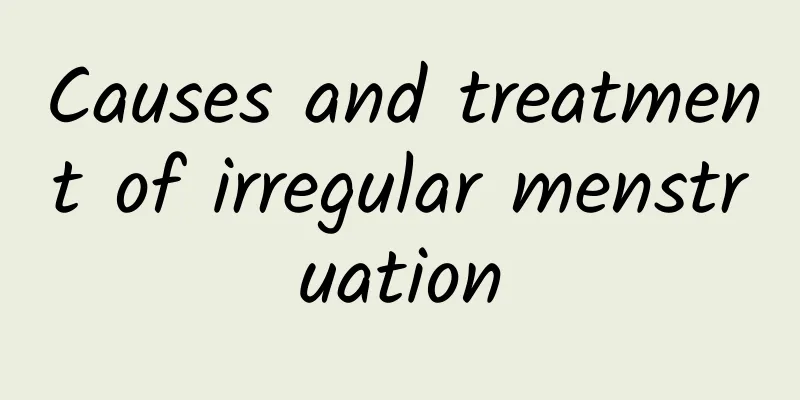Causes and treatment of irregular menstruation

|
Irregular menstruation is a common problem for women and is often caused by a variety of factors. Understanding the causes and treatments can help you better manage this problem. 1. Malnutrition Nutrition is the foundation of good health. Lack of essential nutrients may lead to irregular menstruation. For example, insufficient iron and vitamins can affect the normal secretion of hormones. Including foods rich in iron and vitamins in the diet, such as red meat, green leafy vegetables and nuts, can help improve this situation. 2. Uterine hypoplasia An underdeveloped or small uterus may cause irregular menstruation. This usually requires medical evaluation and treatment. Regular gynecological exams can help detect and address these problems early. 3. Endocrine changes The endocrine system is key to regulating the menstrual cycle. Polycystic ovary syndrome (PCOS) is a common endocrine disorder that may lead to irregular menstruation. Treatment usually involves medication, such as the use of progesterone or oral contraceptives to help restore a normal cycle. 4. Thinning of the endometrium caused by multiple abortions Frequent abortions may damage the endometrium and cause menstrual problems. In this case, endometrial repair therapy may be required. Professional doctors will provide personalized treatment plans based on specific circumstances. 5. Other possible factors Stress, excessive exercise, and rapid weight changes may also affect your menstrual cycle. Maintaining a healthy lifestyle, getting enough exercise, managing stress, and maintaining a stable weight can help maintain a regular menstrual cycle. 6. Treatment recommendations Treatments for different causes of irregular menstruation will vary. Improving nutrition and improving overall health are the basis. For endocrine disorders, medication regulation can be considered. In some cases, hysteroscopy can help identify the cause and provide targeted treatment. 7. Lifestyle Adjustment In addition to medical treatment, lifestyle adjustments are equally important. Maintaining a regular schedule, avoiding overwork, and ensuring adequate sleep can all help improve irregular menstruation. By understanding and managing these factors, women can better control menstrual cycle problems. If you have persistent menstrual irregularities, it is recommended to consult a professional doctor for diagnosis and treatment. A healthy lifestyle combined with a scientific treatment plan can effectively improve menstrual irregularities. |
<<: What are the dangers of thick endometrium?
>>: Can I have sex if I have irregular menstruation?
Recommend
What should be paid attention to during surgery for multiple uterine fibroids? What are the hazards of multiple uterine fibroids?
Surgery for multiple uterine fibroids is worth gr...
Does cervical erosion grade I affect pregnancy?
Does cervical erosion grade I have any impact on ...
What are the symptoms of miscarriage?
Abortion is a topic that many women do not want t...
A 23-year-old woman was diagnosed with vulvar cancer! Her "bad habits" are a wake-up call for everyone! It's worth learning from
"Doctor, I'm only 23 years old, how come...
Understand the early symptoms of ectopic pregnancy to control the deterioration of the disease
Ectopic pregnancy has a great impact on our lives...
What are the symptoms of chronic adnexitis?
Do you know about chronic adnexitis? In life, mor...
What causes uterine fibroids? How to treat them?
What causes uterine fibroids? How to treat them? ...
What can't I eat if my endometrium is thick?
What should you not eat if you have thick endomet...
What medicine should I take for a 2-centimeter uterine fibroid? Can a 2-centimeter uterine fibroid be eliminated by taking medicine?
What medicine should I take for a 2 cm uterine fi...
How should women prevent irregular menstruation?
Irregular menstruation is one of the most common ...
Possible association between home environment and weight control
If you want to control your weight, it is general...
Is pelvic peritonitis harmful to women?
In daily life, pelvic peritonitis is very common,...
Can uterine fibroids be cured?
Can uterine fibroids be cured? Uterine fibroids a...
What are the serious symptoms of premature ovarian failure?
What are the serious symptoms of premature ovaria...
How often do cervical warts recur?
As society becomes more open, it has also led to ...









